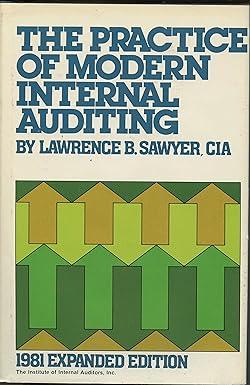Paul Eberhardt, director of internal auditing, fixed the audit supervisor, Rod Grey, with a baleful glare. Terrible.
Question:
Paul Eberhardt, director of internal auditing, fixed the audit supervisor, Rod Grey, with a baleful glare. "Terrible.
Absolutely terrible."
Rod, the picture of misery, nodded agreement.
"I hadn't the slightest inkling," continued Paul, "that Bill Storm was so lacking in tact and the ability to deal with people. He blew the whole campaign sky-high — a campaign that's taken us so long to sell."
"I knew Bill was prickly," said Rod, "and gets people on edge some times —"
"Then why didn't you tell me about it?" demanded Paul.
"Because he's really the best auditor we've got," replied Rod. "And I was always hoping he'd mellow. But this one really tore it."
Rod was referring to a meeting with Bob Lloyd, director ofproduction, and some of his deputies. Paul, Rod, and Bill had called the meeting to sell them on the idea of eliminating tool cabinets.
Hand tools, such as drill motors and crimping tools, are assigned from centralized tool cribs to production supervisors who keep them in cabinets for their workers. Audit after audit disclosed inadequate control over the cabinet tools — large losses, failure to keep precision tools calibrated, and the like.
Bill was convinced that the cabinet system was to blame. A number ofproduction supervisors agreed with him.
But the director of production had never been convinced. He was certain there would be line-ups and delays if workers had to go to the. cribs each morning for their hand tools. The 'auditors had seen dawdling about the cabinets in the mornings and afternoons, and so they didn't think much of the director's arguments.
This time. Bill had taken photographs of a number of badly maintained cabinets and of groups of employees hanging around the cabinets.
He had truly built up a good case.
Paul and Rod, working smoothly witti Bill's material, just about had Lloyd convinced at the meeting. Then Lloyd directed a question to Bill for more information. Bill incorrectly took the question to be an aspersion on his veracity and lashed back. Lloyd, antagonistic toward Bill anyway, roared his displeasure. And then the meeting became a shambles. Lloyd would not hear a further word.
Somewhat calmed by now, Paul said, "There have been other instances, not only involving Bill, where perfectly reasonably suggestions for improvement were rejected solely because of the auditor's attitude — not because of the cogency of his audit findings. We must do something about it."
"Like what? " asked Rod.
"First, we've got to educate people like Bill. Second, we've got to develop some means of screening out the prickly ones in our applicant interviews.
I don't care how technically proficient an applicant looks on paper.
If he can't deal with people, he'll frustrate all our efforts. He'll tear down everything we've tried to build up over the years. Our dreams of cooperative auditing will go right down the drain."
"After Bill's performance today, I've got to agree," replied Rod. "But how?"
"Sit down with Bob, our other supervisor, and brainstorm two sets of suggestions: one for training our present staff, one for an interview questionnaire.
Then bring them to me."
"Will do," said Rod.
Required:
Prepare the lists of suggestions Paul asked for.
Step by Step Answer:






